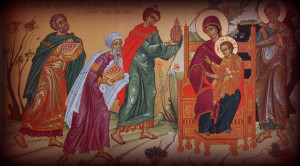Tidings of Comfort and Joy ~ Maya Devi Georg & Chris Kiran Aarya
 During the holidays we show our love through the exchange of gifts, just as the wise men brought gifts to Christ, and just as Christ brought his gifts to the world. While the three wise men brought frankincense, myrrh, and gold, Christ brought teachings that espoused love and compassion.
During the holidays we show our love through the exchange of gifts, just as the wise men brought gifts to Christ, and just as Christ brought his gifts to the world. While the three wise men brought frankincense, myrrh, and gold, Christ brought teachings that espoused love and compassion.
Compassion literally means “to suffer with” and motivates us to help others. Thus suffering can be a tool used to alleviate and end all suffering.
Everyone has known pain and suffering, and humans have long looked for an answer as to why we suffer. It appears that suffering is an intrinsic part of the human experience, and no man or woman is immune.
As it is written in the Bible:
“It is easier for a camel to go through the eye of a needle than for a rich man to enter the kingdom of God.” ~ Mark 10:25
Why? Because the rich man has not known hunger nor homelessness, persecution nor tyranny. Only those that have suffered or witnessed these torments, and have not taken them personally, can understand the pain of humanity.
We must first know that suffering before we can alleviate or end it. Definitions and experiences of suffering vary. As children, our experiences of suffering were often trivial, a dropped ice cream, a lost toy. And sometimes they were less than trivial such as bullying or the loss of a parent, sibling, or friend.
Having been hungry or desperate ourselves we can more easily stand in the shoes of another and offer our help, love, and compassion.
Hearing about the sufferings of another should not lead us to instantly share the tales of woe from our own life story, trying to out-suffer the other or prove that we understand them. Instead, we need to hold space, listen, and see how we can help alleviate their suffering in that moment. Simply being present and listening can be an act of love.
We all suffer in some way. We all have our own cross to bear.
Of course, each instance of suffering in our lives has only prepared us for the next – provided we learn from it. If we let our sufferings make us bitter we end up perpetuating the cycle of suffering because that bitterness will make us pass that suffering along to others. Our suffering should soften, not harden us. Our suffering should make us more, not less, compassionate.
Our hardships shouldn’t harden us.
There are times when people refuse to see the pain they have experienced as applying to anyone else. This happens when people identify with their suffering, and develop ego attachments to those experiences.
They see their instances of suffering as something which makes them special, or sets them apart, something that can be used to gain sympathy and special treatment from others. In short, they choose to identify as the suffering and not as one who has known suffering. They remain in that moment when the suffering occurred and never move beyond it. In many ways, it becomes the defining characteristic of their identity.
When this happens, they waste the opportunity to learn compassion, and are doomed to experience that same pain again and again until the lesson is learned.
We can rely on myths to also teach us about suffering. Joseph Campbell has written of the Persian story of Lucifer, an angel that so loved God he refused God’s own command that the angels should serve man. For his noncompliance, Lucifer was thrown into hell.
“Now it has been said that of all the pains of Hell, the worst is neither fire nor stench but the deprivation forever of the beatific sight of God. How infinitely painful, then, must the exile of this great lover be, who could not bring himself, even on God’s own word, to bow before any other beings!
“The Persian poets have asked, “By what power is Satan sustained?” And the answer that they have found is this: “By his memory of the sound of God’s voice when he said, ‘Be gone!’” What an image of that exquisite spiritual agony which is at once the rapture and the anguish of love!”
~Joseph Campbell, The Mythology of Love
This story tells us that hell seems to be nothing more than our separation from the divine. Yoga tells us that we, our truest Selves, are that divinity. It is our own ignorance that causes us to suffer.
 Hanuman is a good example of forgotten divinity, and a perfect metaphor for humanity. He is a monkey, furry and silly, often forgetting that he is in fact a god. But, when he commits acts of service and devotion he recalls his divine birthright, and performs miracles. This is our true nature, our own divine human birthright.
Hanuman is a good example of forgotten divinity, and a perfect metaphor for humanity. He is a monkey, furry and silly, often forgetting that he is in fact a god. But, when he commits acts of service and devotion he recalls his divine birthright, and performs miracles. This is our true nature, our own divine human birthright.
So, during this holiday season, think of your suffering and the suffering of others. Give the gift of a meal to one who is hungry, medicine to someone that is sick, or help house the homeless. Giving the gift of comfort brings joy to the world. Perform acts of service and devotion, and you will be performing miracles, you will help alleviate the suffering of those around you.
And then see if you can keep this level of care and compassion throughout the year, not just at Christmas time. One of the the wonderful things about this season is that it comes around every year to remind us of our duty of love and compassion for our fellow beings.
Let us transcend our own mortality and our suffering, and become divine bringers of light. Let us do this not through religion nor reliance on divine intervention, but by becoming that divine intervention and giving the gift of love and compassion. And through love and compassion, spread comfort and joy to all creatures.



